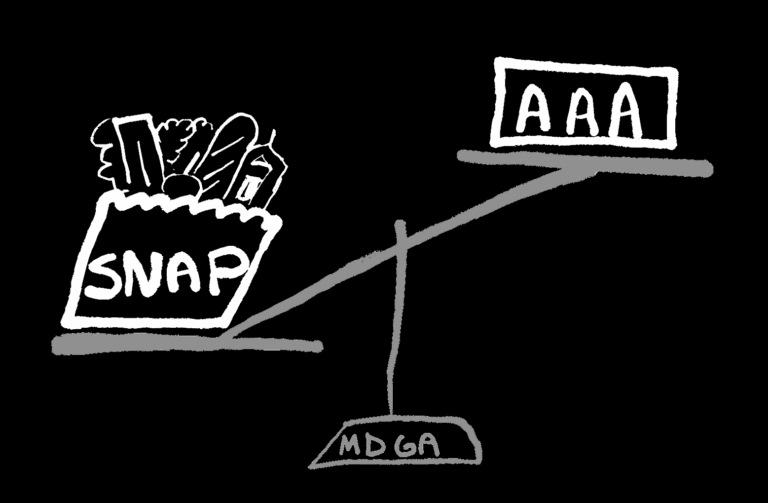
How Maryland could feed SNAP recipients now
“When it begins to rain fear and devastation in our homes and in our neighborhoods… whose responsibility is it ?” ~ Ms. James
On Saturday, Nov. 1, Marylanders who receive SNAP (Supplemental Nutrition Assistance Program) to help pay for essential groceries are expected to lose those benefits. Maryland legislators held a hearing yesterday highlighting the various options Maryland could take to immediately cover those needs (source). But the Governor’s office and others seem unconvinced and uncommitted.
Over 650,000 Marylanders will be in need of food from the SNAP stoppage – this is an emergency that must be addressed immediately by our public leaders with a scalable and resourced response to at least reduce widespread suffering.
If the Governor does not announce today to use Rainy Day funds to cover SNAP, please consider calling his office to press him to do so and share this post.
So what could Maryland do ?
Thanks to a report from the Department of Legislative Services of the Maryland General Assembly, there are some very clear financial options (source). The simplest method would be for the Governor to declare a state of emergency and use emergency powers to transfer funds from the Rainy Day Fund to cover the shortfall and provide benefits.
Covering SNAP in November would utilize $123 million of the $2.25 billion expected balance in the Rainy Day Fund for Maryland, decreasing the fund to $2.1 billion.
Based on discussions during the hearing, even an immediate decision by the state to cover SNAP would still result in a delay for recipients due to logistical issues. Each day of delay adds more time to that gap in service.
What are the arguments for feeding people ?
Most testimony supported using Rainy Day funds to cover SNAP in Maryland for November at least. Here are a few examples :
“I’m afraid the people in my neighborhood are preparing for war. We feel betrayed, left out, and forgotten, again. I’m a grateful recipient. As you can see, I’m at work and I still cannot cover my household bills or supplies without the help of SNAP. If I don’t get SNAP next month, I’m going to have to forfeit my Wifi, maybe my phone, and make more arrangements with BGE. I am also a Section 8 recipient, which means if any of my utilities get cut off, I’m homeless.”
~ Ms. James, testifying as a SNAP recipient to impact on her and her community.
“This morning I got a call from our local Headstart folks. … Their meal service is paid for with SNAP benefits. They don’t have a rainy day fund. …They could use credit but if this continues they won’t have the money to pay that back. …Do they continue to keep their doors open, knowing that they can’t feed the kids? Or do they shut down temporarily and not provide any Headstart programming just because they cant provide their food service?”
~ Del. Ghrist (R – District 36 including Caroline, Cecil, Kent and Queen Anne’s counties)
“To me, there’s nothing more valid than the emergency in front of our nose. And that’s the catastrophe of people going to the store Saturday morning expecting money on their benefits card and finding out they’re not.”
~ Del. Barnes (D – District 21 including Anne Arundel and Prince George counties)
What are the arguments against feeding people ?
In particular for Frederick residents, it may be surprising that the most compelling argument against covering SNAP came from Sen. Karen Lewis Young (D – District 3, Frederick County). A quote from her:
“At what point do we need to be concerned about an effect to our bond rating in terms of our ratio for the rainy day fund?”
This concern for the state bond rating was picked up by Gov. Moore’s office after her comments as well, and started to be reiterated in their responses about why they are not committed to covering SNAP.
In the personal opinion of this blogger, this is an absurd and offensive question to ask in a food emergency. Bond ratings could be perfect while 650,000 people die of starvation – is that a valid premise for a tradeoff ?
However, even the suggestion that using Rainy Day funds to cover SNAP would affect a bond rating is dubious at best. Del. Barnes, Chair of the House Appropriations Committee, clarified that Maryland had used and carried Rainy Day funds ($2.25 billion for FY26) at a 5% benchmark of general fund revenues for 15 years without impact to the state bond rating, and that the current proposal would still leave the fund at approx 8% benchmark (well above that threshold). Put more bluntly by a state expert :
“I don’t think the $123 million alone is going to be a tipping point [for rating agencies]. It gets into more of the longer term budget challenges the state has and how we address those challenges and how we maintain some sort of balance. It’s kind of a broader question that’s bigger than just $123 million.”
~ David Romans, Department of Legislative Services, MD General Assembly
Another aspect the Governor’s office emphasized was that federal agencies have warned that reimbursement of any State funds may not come, although a coalition of Democratic states (including Maryland) are already suing over the stoppage (source). Representatives from Gov. Moore’s office in the hearing leaned on trying to make sure the federal government ‘does the right thing’ as their primary focus.
Will Maryland cover $134 million of SNAP with the $2.25b fund ?
This is a story in progress, and it’s up to us and our leaders how we respond. As mentioned at the start, in the case that Gov. Moore’s office does not announce coverage of SNAP with rainy day funds, this writer would propose calling to pressure a change.
The hearing also highlighted how food banks and disbursement systems are already unable to handle current needs from the shutdown. This blogger believes that expecting charities to pick up a systemic failing is a recipe for humanitarian disaster.
Donating to a local charity or engaging in mutual aid organizations is a worthwhile effort to help neighbors. But we cannot and should not overlook how those with the most power in our state are delaying and dismissing the very real food insecurity crisis while they have resources to help.
